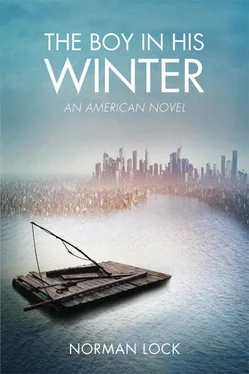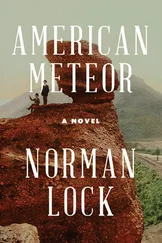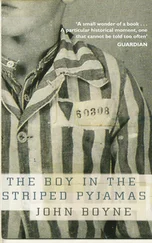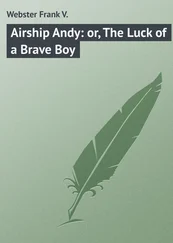“Drunk,” said Edgar; and to forestall the other man’s next question, he went on hurriedly: “He fell and hit his head against the gunwale.”
I could see the captain hesitate between a duty-bound pursuit of truth and his impatience to be gone and out of the rain. The latter won. He did look miserable, the water falling from his hat.
“There’s a hospital in Wilmington. Will he live till then?”
“He’s dead drunk is all,” said Edgar, laughing.
“Get ready for the towline. You better get him below.”
He returned to the boat and barked orders to his crew. James helped Edgar drag his brother below, then returned and climbed up on the bridge. Edgar followed him on deck and, receiving the tow rope from a crewman, made it fast. The captain boarded us again. Edgar blanched.
“Let me see your boat papers.”
Edgar went into the saloon to fetch them. The officer scanned them and handed them back.
“They’re in order,” he said. And then he added, ironically, “People lose their boats in a hurricane to more than wind and water.”
He went back aboard, and in short order, we were under tow toward a boatyard in Chesapeake City. That night, we slept on the Psyched while the rain increased and rattled on the hull and the canal water rose and lapped. By morning, the rain had stopped. The boat was trundled out of the water on a length of track that led inside a shed of grizzled boards, and her damaged shaft was pulled. The foreman promised she’d be ready in late afternoon.
The brothers walked along the canal: Edmund to find a barroom, Edgar to keep him halfway sober. James and I walked west on Boat Yard Road, then turned onto Lock Street, where, farther down, we came on a traveling carnival. You know the kind, with rides and stalls of redemption games and a line of tents with a tired barker announcing freaks. These were ordinary: scaled-up or — down versions of the human frame, stunted or elongated limbs, a man got up as a three-headed dog, and a topless woman lolling on a chaise longue, lazily flipping her mermaid’s tail.
Once, Tom Sawyer had paid Hannibal’s only certifiable lunatic to lie out on the mudflats, her top half naked, her legs and bottom stuffed into a canvas fish tail with painted scales resembling shingles. That was another one of his schemes to scare the daylights out of Jim. Only Jim became infatuated with her — an unforeseen circumstance that amused Tom endlessly. Poor Jim would moon about the mudflats by day and, carrying a lantern, at night, looking for his mermaid, who was never seen again. Crazy with rapture for this fabricated creature of the deep, he’d have stolen himself away from his lawful owner and forsaken his unlawful wife and children to be with a chimera, which, doubtless, would have broken his sad heart. I’d feared for his wits and stayed near him in case he should decide to drown himself for love. (Why a black slave and not I could have been made desperate by love is a mystery.) Standing in the tent, sweating with shameful remembrance and with the close and stinking tented air, I said to myself, I’m sorry, Jim, for the part I often played in your torment and for the pleasure I took.
I listened in my mind for an answer but heard nothing but the barking of the phony Cerberus standing guard at the gates of the underworld, scratching an itch on its behind. I was ignorant of all mythologies. I knew little about the life after this one, except what Miss Watson had rammed down my throat, chased with castor oil. But I sensed in the stirring of a canvas flap at the rear of the tent the presence of something uncanny and not of this world. There was a shadow there that swelled and shrank in the canvas folds. I recalled the white tent’s flap at Vicksburg, which opened on a stack of Union dead. I was scared.
“Let’s go,” I said to James, who seemed to understand my uneasiness.
He had the gift, like Jim. Was it no more exotic, no more mysterious than sympathy? But what is more mysterious than this resonance, this etheric transmission whose source and purpose is affection?
Maybe the story I’m telling is just another one about love.
We returned to the boatyard in time to see the Psyched float off the trolley into the water. The foreman started the engines and backed her into the canal in a cloud of diesel smoke. Satisfied with how she answered the helm, he brought her alongside the dock. James jumped aboard and took the wheel. I followed and, without a word, went below to think. Even a fourteen-year-old boy sometimes has to think. After a while, I heard the brothers come aboard and the boat get under way.
WE HEADED EAST ON A SLACK TIDE and left the C&D Canal below Delaware City. All was well as we hugged the Jersey side of Delaware Bay, dropping southerly to Egg Island Point, then southeast for the Jersey capes. Rounding them, we pushed into the Atlantic in a low sea and then northward to Little Egg Inlet, above Atlantic City: a seven-hour cruise from the C&D’s eastern entrance. We left the ocean at Little Egg and crossed Great Bay to Bogans Cove — the end of our journey and of my childhood. The sun was nearly fallen over Goose Cove, to the west of us, while we tied up at a ruined pier behind an empty building where once small boats had been built. Its bricks needed pointing, the mortar mostly eaten away by rain and the salt air of the marshes; the roof was gone in places, and not a window had been spared the stones of rampaging boys. The place must have been favored by lovers. The cracked asphalt, annexed by blueweed, was sown with French letters — James called them “little socks of love”—where fugitive pleasure had occurred, rough-and-tumble, in the backseats of cars. A car parked beside the loading bay had its tinted windows up. Its cooling engine ticked as if counting down — a bomb about to detonate. James was uneasy, but the brothers walked toward the car in a common delirium of greed. James and I remained behind in the cockpit.
Yes, I need to do this right. It’s my one concession to the guile of storytelling. A climactic moment for the four of us and a hinge on which the balance of my life will swing. An accident — unless, as it did the sparrow, providence saw what was about to fall down on us with the weight of inevitability. None of us saw it coming, although James sensed something in the air. It smelled of tidal mud and rot. He searched it with his broad nose as if to scry our fortunes. Edgar and Edmund were standing in a darkness cast by a corrugated iron roof above the loading bay. Two men in suits were leaning against the car; a third, the driver, stood opposite. Edgar turned and whistled for us to join them. I started toward the transom door, but James stayed me with his hand. I recalled seeing it bleed when he nicked it cutting bait. Where was that? Near Roanoke, whose first settlers vanished. I remembered my surprise at seeing the color of James’s blood. Red. What had I expected? I was such an ignorant and benighted child!
“James! Albert!” Edmund called. I thought it strange: He rarely spoke to me, and only reluctantly or disdainfully would he speak to James. “Some people want to meet you.”
“You stay here, Mr. Albert!” James said in a low voice that seemed to hiss at me. “I don’t like the look of this. Keep your eyes wide open. If you see trouble, you get the hell away from here. Hide yourself in the marsh. Understand?”
I nodded, and with an enigmatic smile, he stepped onto the dock and walked toward the car. I was seeing the last of him. James was another who vanished from my life in time. (But there are zones, remember, where clocks have no dominion.) I heard a car door slam, then angry voices, shouts, scuffling. Edgar goddamned his brother, who had worked his knife up below a rib. Edgar slumped against the car, then crumpled among the blueweed, shards of glass, and little socks of love. It all happened too fast to make a story of it.
Читать дальше












